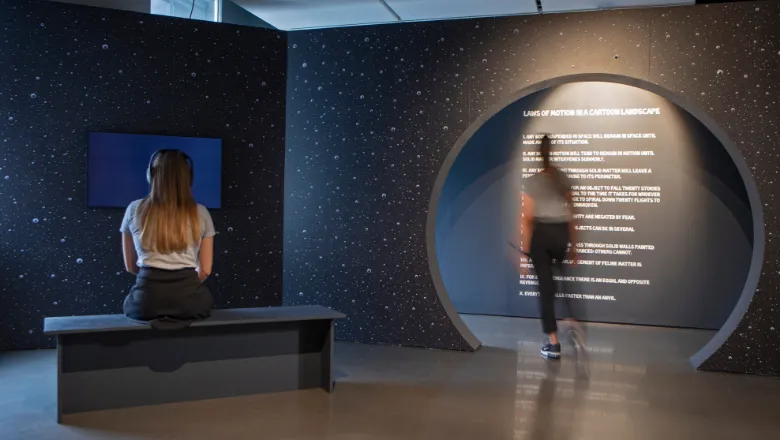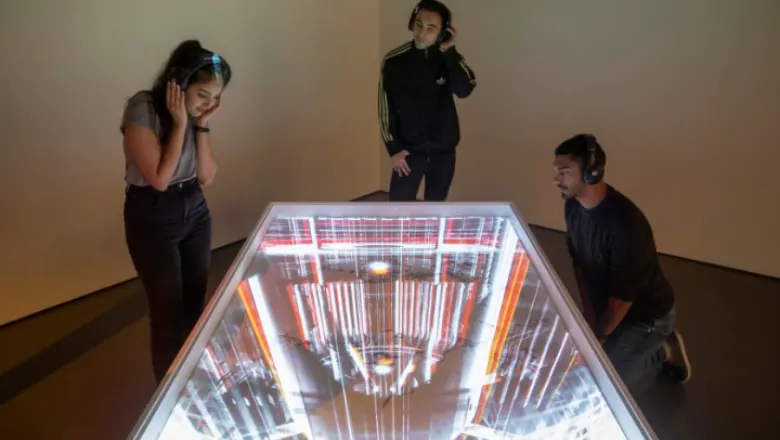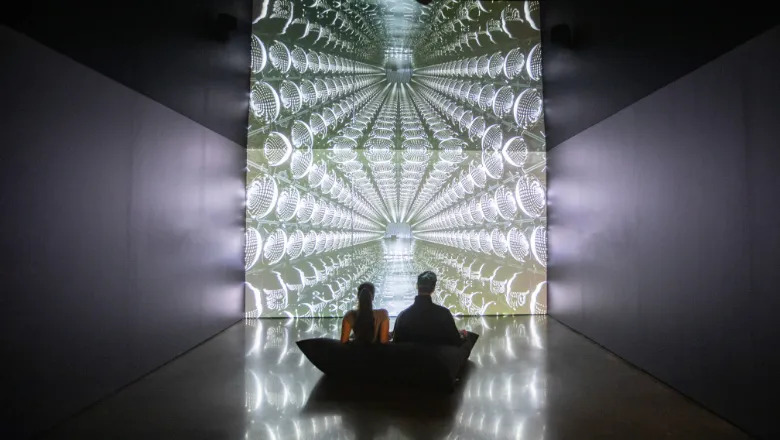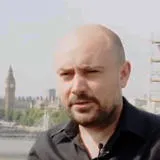Could dreams be made of matter? Do spiders know the shape of the cosmos?
DARK MATTER: 95% of the Universe is Missing is now open. The latest exhibition from Science Gallery at King's College London imagines the unseen and questions the invisible.
Running from 6 June to 26 August 2019, DARK MATTER brings together ideas at the interface of physics, technology, philosophy and art, informed by conversations and collaborations with leading King’s theoretical physicists.
Drawing on research from the Department of Physics within the Faculty of Natural & Mathematical Sciences King's College London, DARK MATTER explores the biggest questions in contemporary physics. What exactly makes up our Universe? Why, according to the world’s leading scientists, can 95 per cent of it not be observed?
 Even darker matter - Andy Holden (2019)
Credit: Science Gallery London
3D animation and sound. Anaglyph 3D glasses required for viewing
Even darker matter - Andy Holden (2019)
Credit: Science Gallery London
3D animation and sound. Anaglyph 3D glasses required for viewingNormal matter – everything that we can see and observe – makes up just five per cent of the Universe. The rest, including dark matter and dark energy, is an unknown which scientists have been hunting for nearly a century.
Dark matter is passing unimpeded through each of us constantly and acts as a cosmic support for galaxies in the Universe, including the one we call home. Despite this we cannot see it or touch it. This season aims to investigate this contradiction, exploring not only dark matter itself but also questions of how science aims to explain reality.
Season advisor Malcolm Fairbairn, Professor of Physics
Artist Aura Satz worked with Professor Malcolm Fairbairn to create Tuning Interference: Dark Matter Radio, an immersive installation which translates dark matter simulations into sound patterns that change according to the listener’s location in the space.
Laws of Motion in a Cartoon Landscape is an immersive animation installation by Andy Holden which reflects on the physics of a cartoon landscape, developed with Professor John Ellis from the Department of Physics.
Science Gallery London is a place to encounter the unexpected, so it is the ideal space to explore one of the most fundamental mysteries of the Universe. We are delighted to present the third season in the Gallery, DARK MATTER, which showcases thought-provoking research from King’s College London, alongside creative responses from international artists and the Gallery’s Young Leaders
Munira Mirza, Executive Director for Culture at King’s College London
Scientists’ ongoing quest to understand dark matter is a lens through which to think about the human desire to reveal the unknown. The DARK MATTER season brings together scientific research, artistic expression, storytelling and philosophy to communicate and explore the limits of human knowledge and our fascination with the unknown.
John O’Shea, Head of Programming at Science Gallery London
 There's more to it than meets the eye - Yu-Chen Wang (2019)
Credit: Science Gallery London
Single-channel video with sound, drawing on paper.
There's more to it than meets the eye - Yu-Chen Wang (2019)
Credit: Science Gallery London
Single-channel video with sound, drawing on paper.Running alongside the DARK MATTER exhibition, a series of free events will include Friday Lates, performances, workshops and more.
DARK MATTER: 95% of the Universe is Missing
6 June – 26 August 2019
Free entry, Tuesday to Sunday, 10:00 – 18:00.
Science Gallery London, King’s College London, Great Maze Pond, London SE1 9GU
london.sciencegallery.com
#DARKMATTER
 Mirror Matter, Emilija Škarnulytė (2018)
Credit: Science Gallery London
Single channel video
Mirror Matter, Emilija Škarnulytė (2018)
Credit: Science Gallery London
Single channel video




